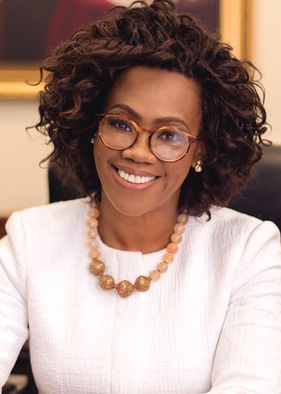September 2023, Year XV, no. 9
Epsy Campbell Barr
Vice-President and Beyond
“Becoming the first Afro-descendant Vice-President was not only important for me, it was the chance for millions of women to see as a real possibility that we can aspire to and reach any position of power that we set out to reach.”
Telos: May 8 2018. You became the first Afro-Costa Rican to become Costa Rica’s Vice-President. A real milestone. What were your feelings then?
Epsy Campbell Barr: Thank you so much for this interview and for the opportunity to share some political reflections on the challenges that I have encountered in my leadership process.
The first thing that I want to say is that for me it was a historic opportunity to become the Vice-President of my country, Costa Rica, and a great responsibility. Beyond my identity as a woman of African descent, it is a great honour to serve the country where I was born, as well as to contribute to the dream of inclusion, justice, non-discrimination and democracy for all the people who inhabit my country.
On the other hand, I come from a long story of support for the rights of people of African descent. And becoming the first Afro-descendant Vice-President was not only important for me, it was the chance for millions of women to see as a real possibility that we can aspire to and reach any position of power that we set out to reach. It is a step, of course, on a historical path that begins to break our structural barriers to political participation for women of African descent, and also to be part of a whole movement of women that fight for equality in political participation.
And in this sense, I want to conclude this question celebrating that today Colombia has a remarkable Afro-descendant woman as Vice-President, Francia Márquez. Francia has an extraordinary strength. It is with a thorough agenda of inclusion for all the people, not only the people of African descent, for democracy and peace. I am so happy to see how the doors are going to open to more women of African descent occupying different positions of power.
What does politics mean to you?
Politics for me means service and the possibility to change what has to be changed. Politics means that we need to use power in favour of the people, mostly for those who need help, for those who
have historically been denied their human rights.This means that we have to understand that the Government and the State are places to think in a sense of community, in a sense of collective and not individual. Politics means that we have to understand that power is not a personal gift, it is a responsibility towards the people, and I want to underline, mainly for those who are excluded. We need to understand that, and if we understand that it is not an isolate position, politics is working together, with each other. For me it means also the wellbeing of the people, and that is why I promote everywhere women’s participation: because I think we have a different sense of what a public service means, what care means. And politics means care for the people too.
I have to say that I am a feminist, an Afro-feminist and that I work a lot for the inclusion of women of all identities, not only in my country but around the continent and around the world. Obviously, this is not an achievement that I can take credit for personally, but rather it is the result of many women of African descent, from the diaspora, in the fight for their rights. It is an immense responsibility to accompany and support Afro-descendant women who are participating in politics and in the space of power in all sectors. I want to tell you that in the last month I promoted the first coalition of women of African descent in politics globally, because we need to share our experiences.
Now you are the President of the recently established UN Permanent Forum of People of African Descent. What does such post entail?
The UN Permanent Forum of People of African Descent is a new space, as you say. Being a member of this new body gives me, and us as members, a big responsibility. Being the first chair of the Permanent Forum also means a lot. This is an amazing achievement in the struggle for the recognition of Afro-descendant people, as well as a fundamental tool for reparatory justice. It was a long way to achieve this space, that is also a result of my work as Vice-President of Costa Rica, because it was my country in the representation in New York with Ambassador Rodrigo Alberto Carazo, who is now part of the Human Rights Council of the UN, and with the participation and leadership of the Ambassador of Chad, who promoted the process for the approval of the Permanent Forum. When we are using the power to break down historical barriers, we honour the efforts of many people that walked before us.
It is a space that has, among other functions, that of contributing to the First Declaration of Human Rights of People of African descent, we had two sessions, one in Geneva and the other one in New York, that saw a broad participation of civil society organisations. We discussed at length, one of the main issues being to have concrete action for reparatory justice, to end, as a global outcome, systemic racism against black people of African descent, and also calling for the second Decade for people of African descent: as you know we are in the end of the first Decade that it is supposed to terminate on the 31 of December 2024. Because the reality is that we cannot have enough outcomes for the dignity of the people, and that is why I am totally convinced that we have to keep on working. Thus, in our discussion in the second session, one of the proposals was to promote in the General Assembly of the United Nations the proclamation of the Declaration of the second Decade.
Also, I have to say that the profile and the experience of each of the ten members of the Permanent Forum are impressive and we work together to advance justice and our inclusion agenda.
In 2018, Costa Rica ranked 1st in the Retirement Index Global, and in 2022 as the second-best. It is always on the shortlist. Many Italians have already moved there. What are the reasons for this choice?
The first thing that I have to say is the sense of the people of Costa Rica. We are very warm people and this is part of our identity as a country.The second is that we are a safe country. It is a country where you can easily move around. The people here are so different from most countries in Latin America. We have a “well-being Government” that gives the people the opportunity to have social, economic and political rights. And that means stability. When people want to retire, they need stability. But, of course, also the beauty of the environment plays a role! I am not objective, but this is one of the most beautiful countries, a small country that has a diverse not only environment -Costa Rica is home to over 5% of the world's biodiversity- but also cultures. I also want to say that we give not only happiness to the people who come here, but also love. And that is why I think that this is a place that the people want to be part of, not only for retirement: we are also a country that receives a lot of tourists, every year. You can go to the mountains, you can go to the beach, to the Caribbean side, to the Pacific side, you have canals, huge rivers…we have a lot, but we have also a different sense of food in the different parts of the country. I feel that if you are thinking about retiring, you could take into serious consideration my country, Costa Rica!
Marco Sonsini
Editorial
At 3:30pm CET in a hot August afternoon, in front of my computer screen, I was waiting to interview Epsy Campbell Barr. A new experience for me, used to receiving answers to our questions in writing, and imagining, just imagining, what our guest would be like in person. And suddenly she appears on the screen, beautiful, radiant, smiling and welcoming. Wait, hang on a second. We are going to talk about female empowerment and the first adjective I use to introduce Epsy is 'beautiful'? Yes, and I reiterate this without a qualm, because Epsy Cambell Barr's beauty is not only outer, but is illuminated by an extraordinary passion, vitality, and strength. Our September guest for PRIMOPIANOSCALAc is the former Vice-President of Costa Rica, and, among other things, the current Chairperson of the UN Permanent Forum on People of African Descent, a platform for improving the safety and quality of life and livelihoods of people of African descent. The Forum also serves as an advisory body to the Human Rights Council, in line with the programme of activities for the implementation of the International Decade for People of African Descent. Around 200 million people identifying as being of African descent live in the Americas. Many millions more live in other parts of the world, outside of the African continent.Whether as descendants of the victims of the transatlantic slave trade or as more recent migrants, they constitute some of the poorest and most marginalised groups worldwide Ms Campbell was, as she tells us in this extraordinary interview, one of the promoters of the first International Decade for People of African Descent, proclaimed in a Resolution (68/237) adopted on 23 December 2013 by the UN General Assembly to address systemic discrimination and legacies of the past to bring about the full recognition, justice, and development for people of African descent worldwide. Being the first chair of the UN Forum for Epsy "is an extraordinary achievement in the struggle for the recognition of Afro-descendant people, as well as a fundamental tool for reparatory justice.” Epsy’s historical commitment goes far beyond this role: “I have to say that I am a feminist, an afro-feminist, and that I work a lot for the inclusion of women of all identities, not only in my country but around the continent and around the world.” A woman who has held important political roles, who gives us a valuable and deeply felt definition of politics: “Politics for me means service and the possibility to change what has to be changed. Politics means that we need to use power in favour of the people, mostly for those who need help, for those who have historically been denied their human rights.” Hard and deep themes, difficult and gritty struggles which Epsy navigate through victories and defeats, but never giving up. Always ready to “break down historical barriers”. Our interview ends with a mention of her country, Costa Rica, a paradise on Earth. Costa Rica is one of the most biodiverse places on the planet. Around half a million species are known to live there, which is equal to about 5% of all estimated species on Earth. Considering Costa Rica only makes up 0.03% of the world's landmass, this showcases the remarkable biodiversity of such a small country. After suffering some of the highest rates of deforestation in the world in the 1970s and 1980s, Costa Rica has regrown large areas of its tropical rainforest. Between 1940 and 1983, Costa Rica lost approximately 50% of its original forests. It is now the only tropical country to actively stop and reverse deforestation. It really has set the bar when it comes to climate action and protecting biodiversity. Costa Rica also has one of the highest percentages (26%) of protected land in the world. It is no surprise then that, in 2019, the country was named Champion of the Earth by the United Nations for its contributions to fighting climate change and protecting nature. We can only learn from Epsy, her people, and her country. A lot!
The 2023 covers of PRIMOPIANOSCALAc were designed to create, something similar to museum merchandise. Every month we personalise an item with the face of our guest in black and white. This way, a t-shirt, magnet or shopper becomes a memory, an experience, a symbol. Our guests become icons, just like museum pieces such as Da Vinci’s Vitruvian Man, Van Gogh’s sunflowers, Michelangelo’s Creation of Adam in the Sistine Chapel…For Epsy, we have chosen an upcycled jute bag handcrafted from reclaimed coffee sacks, the perfect symbol of her country’s commitment to environment protection, and a clear tribute to one of the most important products of Costa Rica: coffee! which has earned a distinguished reputation for its velvety smoothness, delicate flavour, and exceptional quality.
Mariella Palazzolo

Epsy Campbell Barr is the Chairperson of the UN Permanent Forum on People of African Descent. An economist specialising in Development Cooperation, after her studies she became a political activist in defence of the rights of women and people of African descent. She was a member of the Legislative Assembly of Costa Rica for two legislatures (2002-2006 and 2014-2018), elected with the Citizens' Action Party (PAC), of which she was also founder and Group Leader. In 2018, she served as Minister of Foreign Affairs. From 2018 to 2022 she was Vice-President, elected, of Costa Rica, the first Afro-Costa Rican woman and second woman of African descent to hold this position.
Among the promoters of the Inter-American Convention against Racism, Racial Discrimination and Related Forms of Intolerance, founder and leader of the Afro-Costa RicanWomen's Center, she was, among other things, coordinator of the Women's Forum for Central American Integration of the Network of Afro-Caribbean and Afro-Latin American Women. Ms Campbell is a member of the Washington-based think tank The Inter-American Dialogue. She is the author of numerous articles and publications on the topics of democracy, inclusion, political and economic participation of women, and other topics.
In 2021, she was recognised by MIPAD - Most Influential People of African Descendent, among the 100 most influential people of African descent in the world.
The granddaughter of Jamaican emigrants to Costa Rica, she was born in the capital city of San José, in 1963. Epsy is married and has two daughters, Narda and Tanisha.
Marco Sonsini







SocialTelos